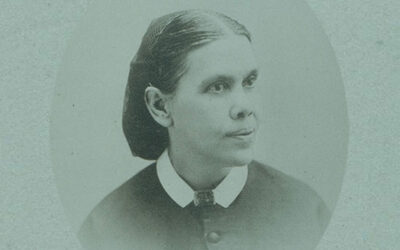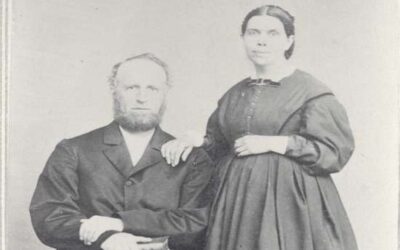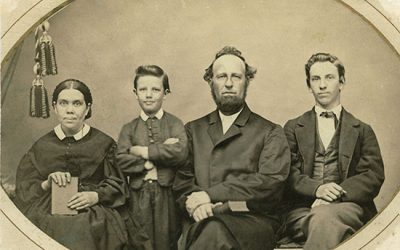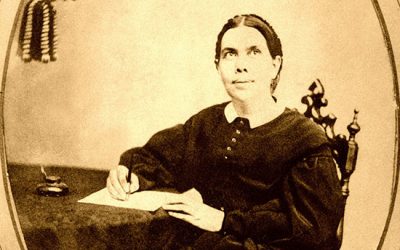The Bible—without a shadow of a doubt—is the most important book. It’s the standard we use to test all other writings, including those of Ellen White.
The Seventh-day Adventist Church believes that “the writings of Ellen White are not a substitute for Scripture. They cannot be placed on the same level. The Holy Scriptures stand alone, the unique standard by which her and all other writings must be judged and to which they must be subject.”1
We get why you may be asking this question, though. It’s true that Ellen White is a figure unique to Adventism who has provided us with a lot of insights on various Scriptural topics, such as the Sabbath, the Second Coming, and the great controversy between Christ and Satan that envelops our world.
Inspired by the Holy Spirit, she received and shared insights from God that helped confirm Scriptural truths that later became Adventist doctrine.
But all her writings have pointed back to studying Scripture more deeply to understand these concepts. They originate from the Bible, not from her writings.
She herself wouldn’t have hesitated to say that the Bible is more important than her writings. We’ll unpack some of her own words as we explore these topics:
- Why the Bible is more important
- What Ellen White said about her writings
- How to use Ellen White’s writings in your spiritual journey
Let’s begin.
Why the Bible is more important

Photo by John-Mark Smith
The Bible is the ultimate authority and source of truth. Everything else—including Ellen White’s writings—must be tested by this standard (Isaiah 8:20).
As Adventist historian and author George Knight pointed out in an interview, “Without the Bible, we wouldn’t have any Ellen G. White. Her authority is derived from the authority of Scripture.”2
After all, it’s the Bible that tells us the spirit of prophecy will be one of the spiritual gifts in the last days (Acts 2:17; Ephesians 4:11-13) and that provides us with the tests of a prophet:
“The gift of prophecy is always based upon Scripture and tested by Scripture.”3
The Bible also has a different purpose than Ellen White’s writings.
It’s a timeless book that provides principles applicable throughout history. It’s our standard for evaluating every other aspect of life. And it’s the basis for every doctrine.
On the other hand, Ellen White’s writings were meant for a specific time and purpose—and they must harmonize with the standard of Scripture. They weren’t meant to provide the basis for doctrines but only to provide a greater understanding of the doctrines in the Bible.
Here’s how Gerhard Pfandl, retired associate director of the Adventist Biblical Research Institute, puts it. He said Ellen White’s writings are:
“…God’s messages for a particular people…at a particular time in history—the end time. Her writings are not a new or additional standard of doctrine, but a help for the church in the time of the end.”4
Ellen White herself very clearly understood her role. So let’s look at what she said.
What Ellen White said about her own writings and the Bible
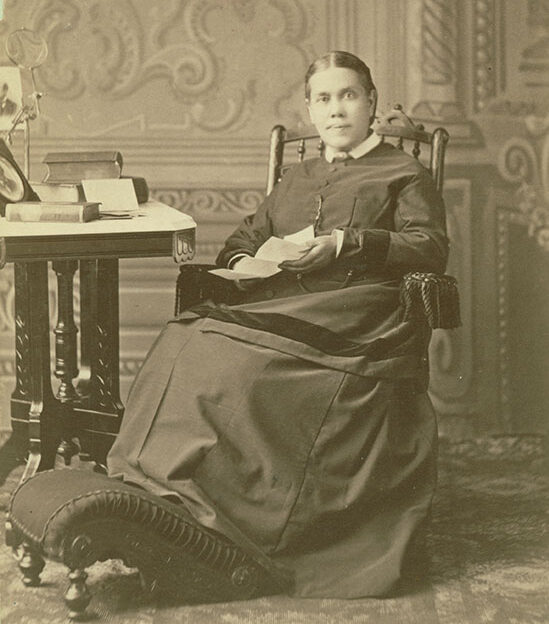
Ellen G. White, circa 1878 – Photo courtesy of the Ellen G. White Estate, Inc.
Ellen White saw the Bible—both the Old Testament and the New Testament—as the ultimate authority and guide for every aspect of Christian faith and life. She called her writings “a lesser light to lead men and women to the greater light”—the Scriptures and Jesus Christ.5
She always supported and upheld the Protestant principle of sola scriptura (the Bible only):
“In His word, God has committed to men the knowledge necessary for salvation. The Holy Scriptures are to be accepted as an authoritative, infallible revelation of His will. They are the standard of character, the revealer of doctrines, and the test of experience.”6
“God will have a people upon the earth to maintain the Bible, and the Bible only, as the standard of all doctrines and the basis of all reforms”7
And she recognized that the Bible was the standard to test all her teachings too.8
But sometimes, people who heard Ellen White and read her writings misused them. In these cases, she had to give some pretty stern rebukes—and rightly so.
She never wanted God’s Word to be disregarded or ignored in any way because of what she had said.
Here’s an example of a rebuke she had to write to church leaders at the General Conference because they hadn’t followed God’s guidance:
“Do not quote my words again as long as you live, until you can obey the Bible.
“When you make the Bible your food, your meat, and your drink, when you make its principles the elements of your character, you will know better how to receive counsel from God. I exalt the precious Word before you today. Do not repeat what I have said, saying, ‘Sister White said this,’ and ‘Sister White said that.’ Find out what the Lord God of Israel says, and then do what He commands.”9
One time, she even pointed out that her Testimonies for the Church books wouldn’t have been needed if God’s people had studied the Scriptures!
But because they had neglected His Word, God gave Ellen White messages to point people back to its teachings and show them how to apply them in their lives.10
So, what kind of role should her writings have today?
How to use Ellen White’s writings in your spiritual journey

Photo by Emmanuel Phaeton on Unsplash
Ellen White’s writings can provide us with inspired guidance, insight, and encouragement. But they should not take the place of Bible study. Keep the Bible as the basis for your beliefs, decisions, and actions.
If you find that Ellen White’s writings are keeping you from spending time in the Bible, then it may be time to reorient yourself. After all, she wanted us to study our Bibles more and to follow what we find there. That was one of the biggest purposes of her writings to begin with!
But truly, when we use her writings properly, it can increase our appreciation of the Scriptures and lead us to want to study it more. It can also help us in applying it to practical situations.
Here are a few tips for that kind of experience:
- As you learn something new in her books, go back to the Bible and study it out.
- Look for the underlying principles from Scripture. Try to understand the context in which she was writing. She often addressed specific people in specific places and circumstances, so it’s important to find her main point rather than grabbing hold of isolated instructions.
- Don’t create new doctrines off of Ellen White’s statements. She herself said this was not the purpose of her writings.11
These simple steps can go a long way in preventing misunderstanding and keeping Ellen White’s writings in their God-given role.
And if you’re wondering where to start, these books are excellent for seeing how she reflects on the Bible’s truths:
The Bible is the rule of faith and practice for Adventists
If Ellen White were alive today and we asked her about the importance of her writings, she might have responded:
“I recommend to you, dear reader, the word of God as the rule of your faith and practice.”12
Seventh-day Adventists continue to take this counsel to heart.
Though we greatly value her counsel, which was inspired by the Holy Spirit, we build our faith on the Bible and allow her counsel to point us back to it.
But though Adventists don’t hold Ellen White’s writings above the Bible, you may still be wondering whether believing in her prophetic gift is a requirement to be an Adventist. Discover the answer to this question here: “Do I Have to Believe in Ellen White to Be an Adventist?”
- Seventh-day Adventists Believe, p. 227 [↵]
- “Ellen White vs The Bible w. Dr. George Knight | Biblios 14,” SECmedia [↵]
- Ibid. [↵]
- Pfandl, Gerhard, “The Authority of the Ellen G. White Writings” [↵]
- White, Ellen G., The Review and Herald, January 20, 1903, quoted in The Colporteur Evangelist, p. 37 [↵]
- White, Ellen G., The Great Controversy, p. vii [↵]
- Ibid., p. 595 [↵]
- Ibid., p. vii [↵]
- White, Ellen G., Selected Messages, Book 3, p. 33 [↵]
- White, Ellen G., Testimonies for the Church, vol. 5, p. 664 [↵]
- White, Ellen G., A Sketch of the Christian Experience and Views of Ellen G. White, p. 63 [↵]
- Ibid. [↵]
More Answers
Your Comprehensive List of Ellen G. White’s Visions
Ellen White—an author, health-reform advocate, Bible scholar, and one of the most influential founding figures of the Seventh-day Adventist Church—was blessed by the Holy Spirit with the spiritual gift of prophecy (1 Corinthians 14; Romans 12:6-8). During her lifetime, she received direct guidance and inspiration from God in several different ways.
Ellen G. White’s Lasting Legacy
Ellen G. White is a well-known name among Seventh-day Adventists, but she also made an impact in many other parts of history, aside from being a co-founder of the Adventist Church.
Ellen G. White’s Challenging Health Journey
When it comes to lifelong struggles with health, Ellen White is no stranger. In fact, health challenges set the tone for her life early on—years before she was involved in co-founding the Seventh-day Adventist Church.
“What Was Ellen and James White’s Marriage Like?”
Ellen and James White, cofounders of the Seventh-day Adventist Church, met and married under somewhat unusual circumstances. But it’s a sweet story of partners in ministry becoming partners in life. And their married life continued to center on furthering the spread of the gospel together.
What is the Ellen G. White Estate?
What is the Ellen G. White Estate?Ellen G. White’s contributions to the formation and growth of the Seventh-day Adventist Church are an integral part of its history. As a significant co-founder of the denomination, her writings provided millions of people with...
How Can I Know Ellen White’s Messages Were From God?
It’s natural to be a bit skeptical when you hear about someone being “divinely inspired,” or that something is a “message from God,” etc. And we expect nothing different if you’re hearing about Ellen White, an influential co-founder of the Seventh-day Adventist Church, for the first time. After all, the Bible tells us that we’re supposed to test these things!
Ellen G. White’s Time in Australia
Ellen White traveled to Australia in the later part of her life, and she ended up spending nine years there. In that time, she helped the Australian Seventh-day Adventist Church increase in size and strength.
Ellen G. White’s Time in Europe
When the Seventh-day Adventist Church was still young, a council of the church in Europe requested Ellen White, one of Adventism’s key leaders, to come to Europe.
Ellen G. White’s Travels and Worldwide Mission
Though Ellen White, a co-founder of the Seventh-day Adventist Church, is best known for her ministry in the United States, she also traveled to twelve other countries in her lifetime—a big accomplishment in the 19th century when travel was strenuous and long.
Ellen G. White’s Counsel on College Education
Ellen G. (Harmon) White, a significant co-founder of Adventism, is often known for her practical and spiritual guidance for proper childhood education. But she was also significantly involved in the development of Seventh-day Adventist higher education.
8 Pieces of Advice from Ellen White’s Counsel for Families
In this article, we’ll look at the insight Ellen White received from God. We’ll cover 8 major themes she highlighted for families.
Was Everything Ellen White Said Divinely Inspired?
The Seventh-day Adventist Church believes that many of Ellen White’s messages were inspired by God. But that doesn’t mean everything she ever said was prophetic, or meant to be taken as direct instruction from God. So let’s break down how to identify the nature of her many written messages and quotes.
Who Were Ellen White’s Children?
Being the children of a woman with a prophetic calling from God had its blessings and its challenges.
In this overview, we’ll look at the highlights of the lives of Ellen White’s sons during her many years of ministry, as well as the ways each of them decided to serve Jesus Christ:
Ellen White’s Spiritual Counsel on Marriage
As one of the founders of the Seventh-day Adventist Church, Ellen G. White was held in high regard. She was a prolific author and was heavily engaged in the mission of the denomination, prayerfully pursuing the guidance of the Holy Spirit.
Are Any of Ellen G. White’s Prophecies Yet to Come True?
Ellen White, a co-founder of the Seventh-day Adventist Church, demonstrated many times over that she had the spiritual gift of prophecy. Some of her predictions’ timelines have already passed, and those prophecies have been fulfilled. Others have yet to be fulfilled.
What Was Ellen G. White’s Counsel on Music?
Ellen G. White, one of the founders of the Seventh-day Adventist Church, also provided helpful guidance regarding music choices for Christians. She provided sound principles to answer questions the young Adventist Church had.
What Ellen White Said About Using the Bible in Education
Ellen White, one of the founders of the Seventh-day Adventist Church, believed that education was not complete unless it was founded upon the principles of the Bible.
But what does the Bible have to do with math or science? Is it important to integrate the Bible with schoolwork?
What Were Ellen White’s Visions About the Adventist Church?
What Were Ellen White’s Visions About the Adventist Church?Led by the Holy Spirit, Ellen G. White was given many messages, counsel, revelations, and visions about the Bible, history, prophecy, and how we can apply biblical principles to our daily lives. She was also a...
Was Ellen G. White Really a Prophet?
If you look at what Scripture provides as tests for a true prophet, Ellen White meets all the criteria.
What is the Spirit of Prophecy (Books 1–4) by Ellen G. White?
Applying biblical prophecy to history, recent events, and especially the future, can be a daunting task. Even a little scary for some. But even so, we can’t help but want to know more. We want to be prepared—to feel like we know how to weather the storm.
Ellen G. White’s Counsel on Christian Education
Ellen White, a co-founder of the Seventh-day Adventist Church, saw that the U.S. educational system during her time was lacking. And as part of her life of ministry, she sought out practical ways to be better stewards of our minds, bodies, and the lives we’re given.
What Does Ellen White Say About Prayer?
Have you ever had a burden you just had to tell someone, but you were afraid of being judged if you did? Ellen G. White, an important figure in the Seventh-day Adventist Church and a prolific writer, described prayer as talking to God in a personal way—He’s the friend we can tell everything to.
Were All Ellen White’s Visions About the Future?
While the visions God gave Ellen White were often about the distant future or last-day events, she had many others that addressed different topics. They may not be discussed as much as her visions about the Second Coming or the End Times, but they tackled some timely topics for her day.
What Did Ellen White Say About End-Time Prophecy?
We can read in Scripture about the series of events and signs that lead up to the second coming of Jesus Christ. And it sounds pretty intense, to say the least. The symbolic nature of the language of prophecy also can make things tricky to understand at first.
Were All Ellen White’s Books Inspired?
As the most translated female author in the world, Ellen White wrote numerous books, articles, pamphlets, and more. These writings focused on developing Christian character, emphasizing Bible truth, practical tips for living well and staying healthy, and discussing effective methods of delivering the gospel message to the world.
How Ellen White Influenced the Adventist Health Message
Seventh-day Adventists are known for their emphasis on healthy living. And Ellen G. White was a significant influence in the development of this priority and practice among Adventists.
What Did Ellen White Teach About Vegetarianism?
One thing you might have heard about Seventh-day Adventists is their emphasis on a vegetarian lifestyle. If you’re wondering why that is, it goes back to our church’s humble beginnings:
Steps to Christ: A Guide to a Relationship with Jesus
Whether you’re just starting your journey with Jesus Christ, are coming back after some time away, or have had a relationship with Jesus for years, using a book—in addition to the Bible—to guide or supplement that relationship can be helpful, comforting, and joyful.
Ellen White and Adventist Healthcare—Ahead of Their Time
Medical care in the mid-1800s was primitive, to say the least. Basic concepts we take for granted—such as proper handwashing or recognizing the dangers of bloodletting—were nonexistent. And doctors often had little more than nine months of training!


